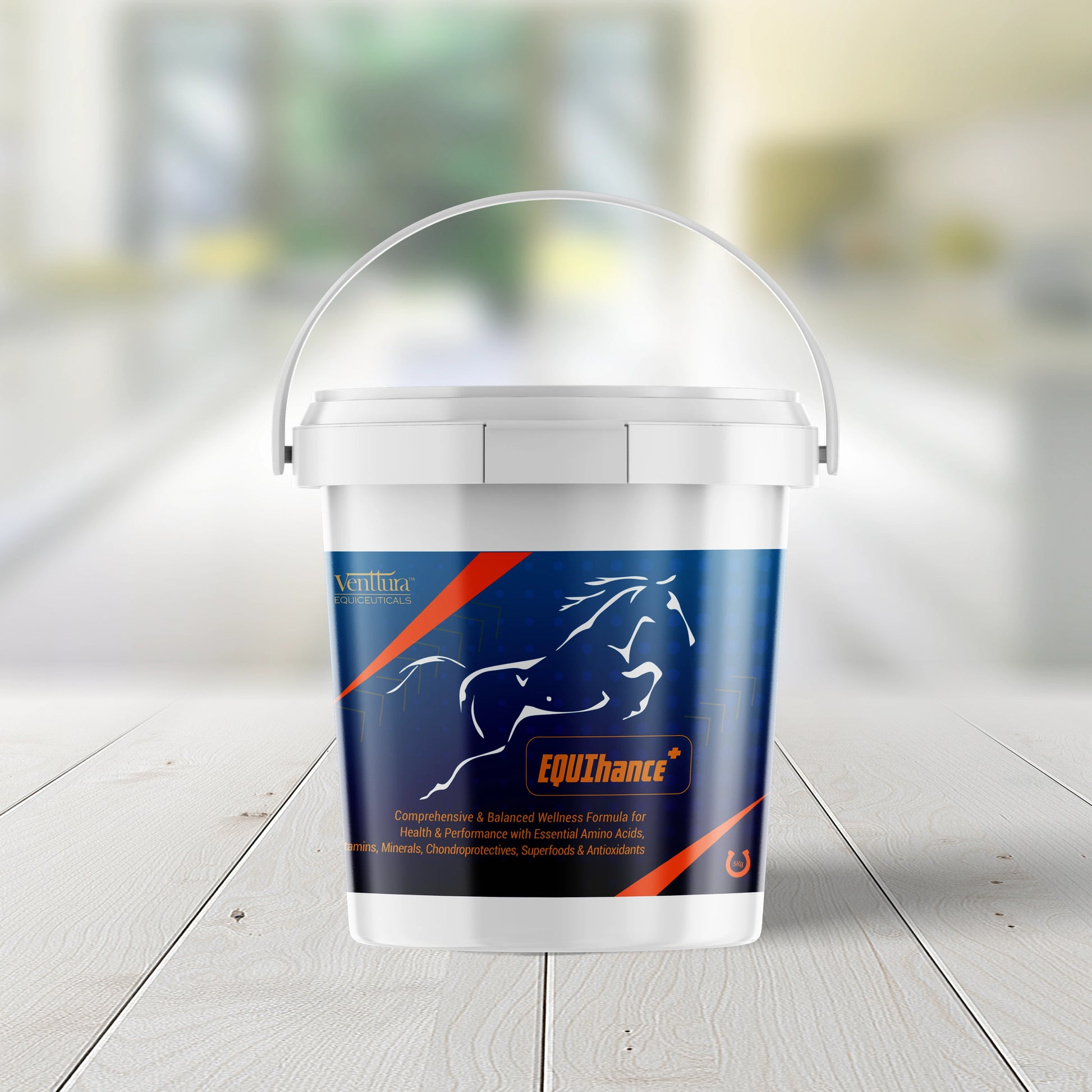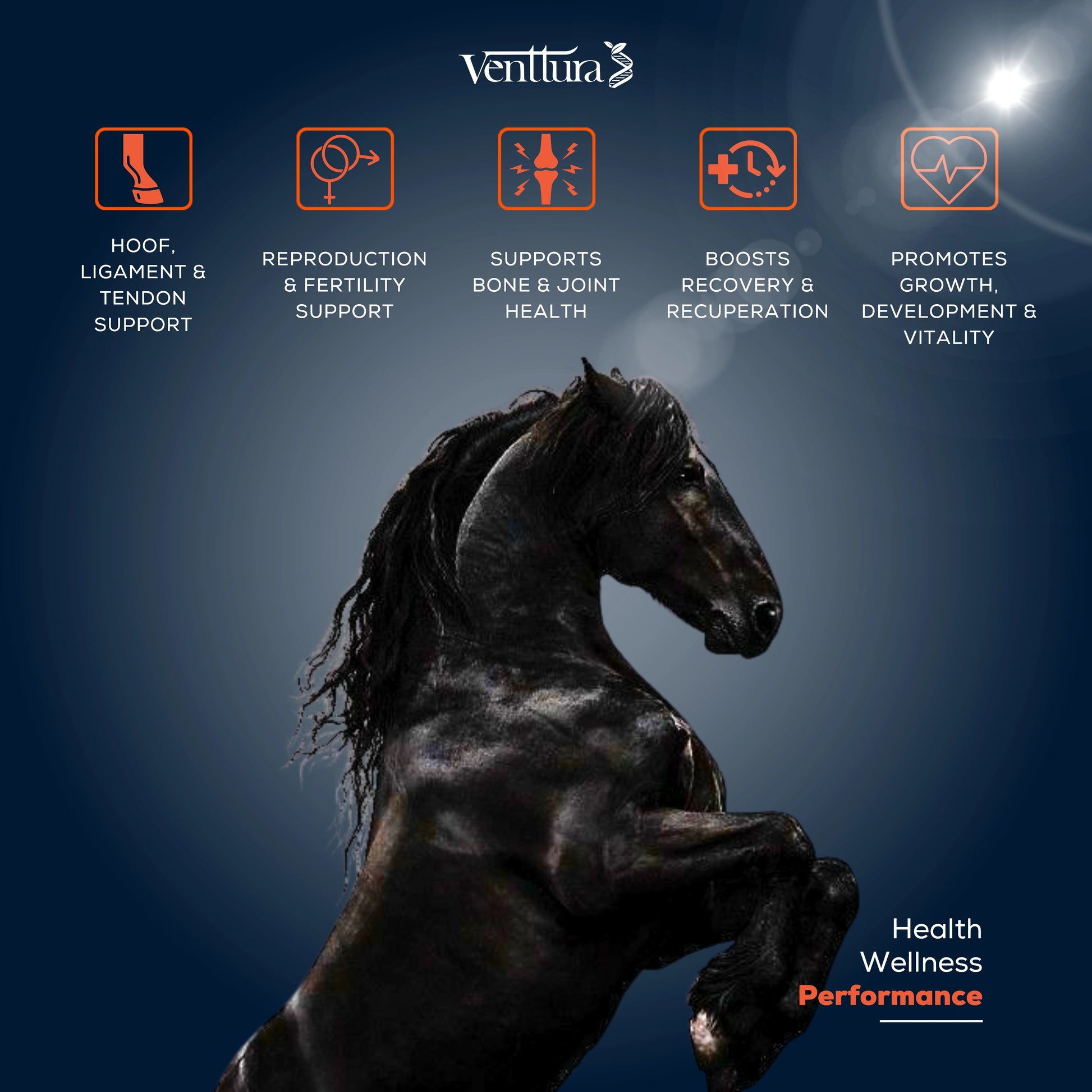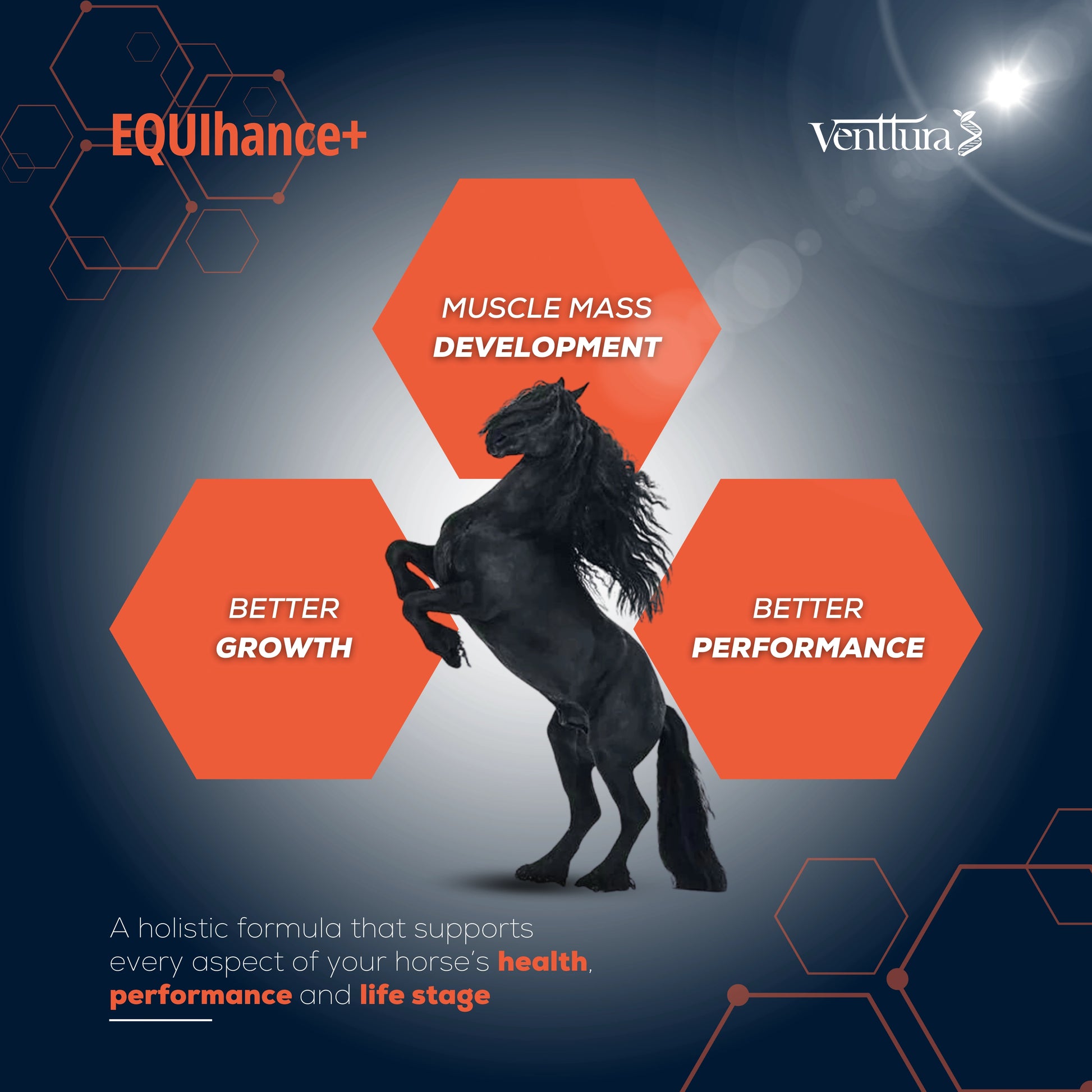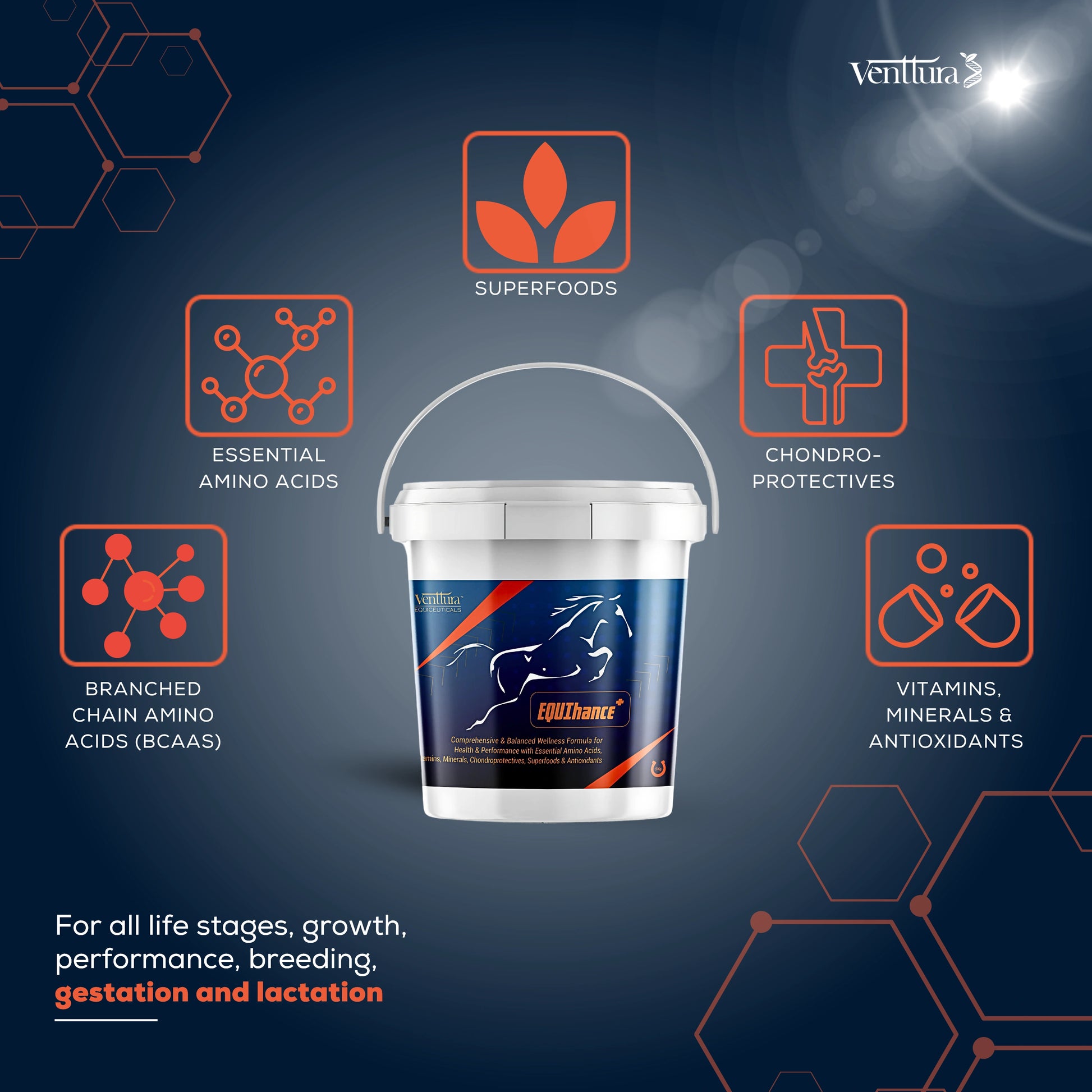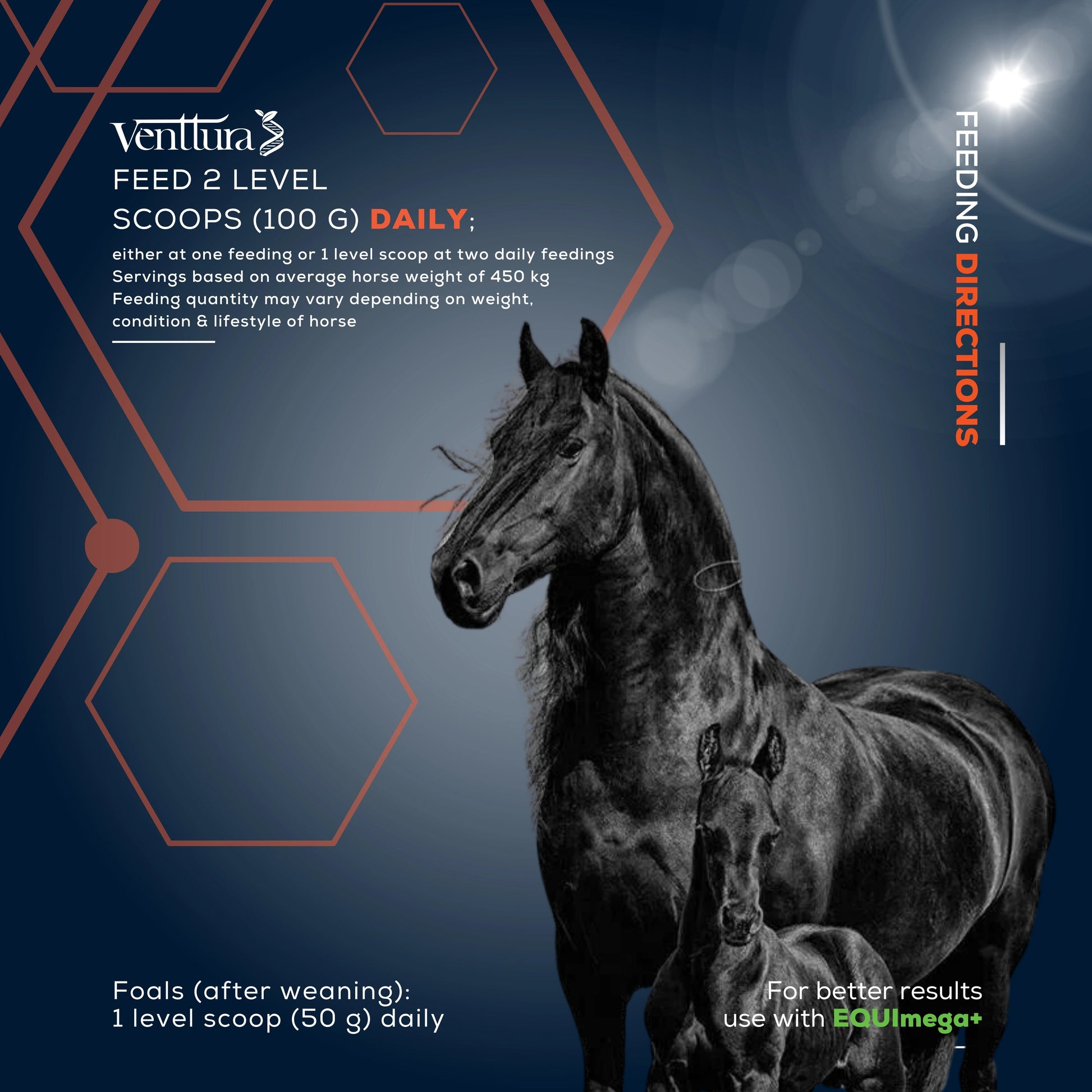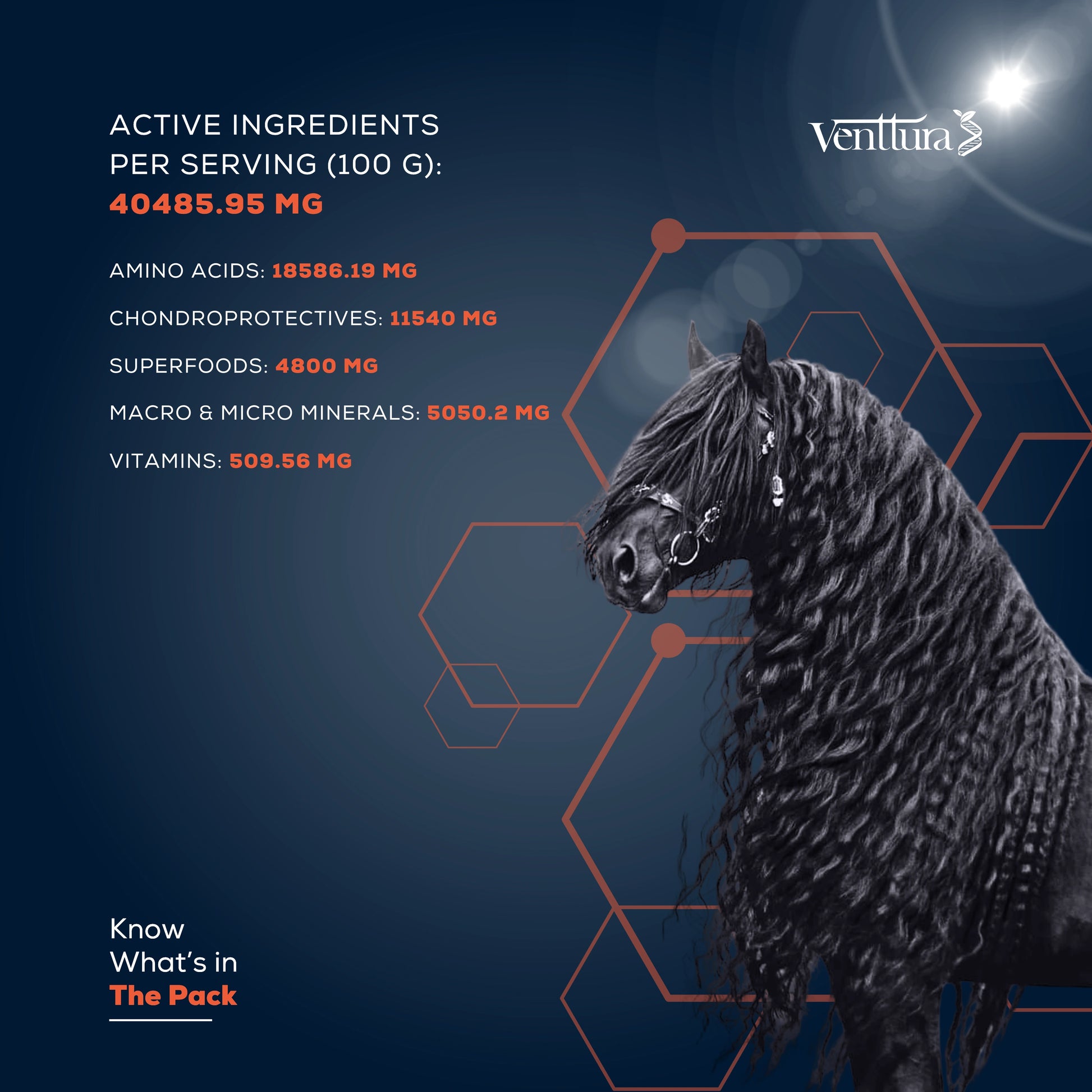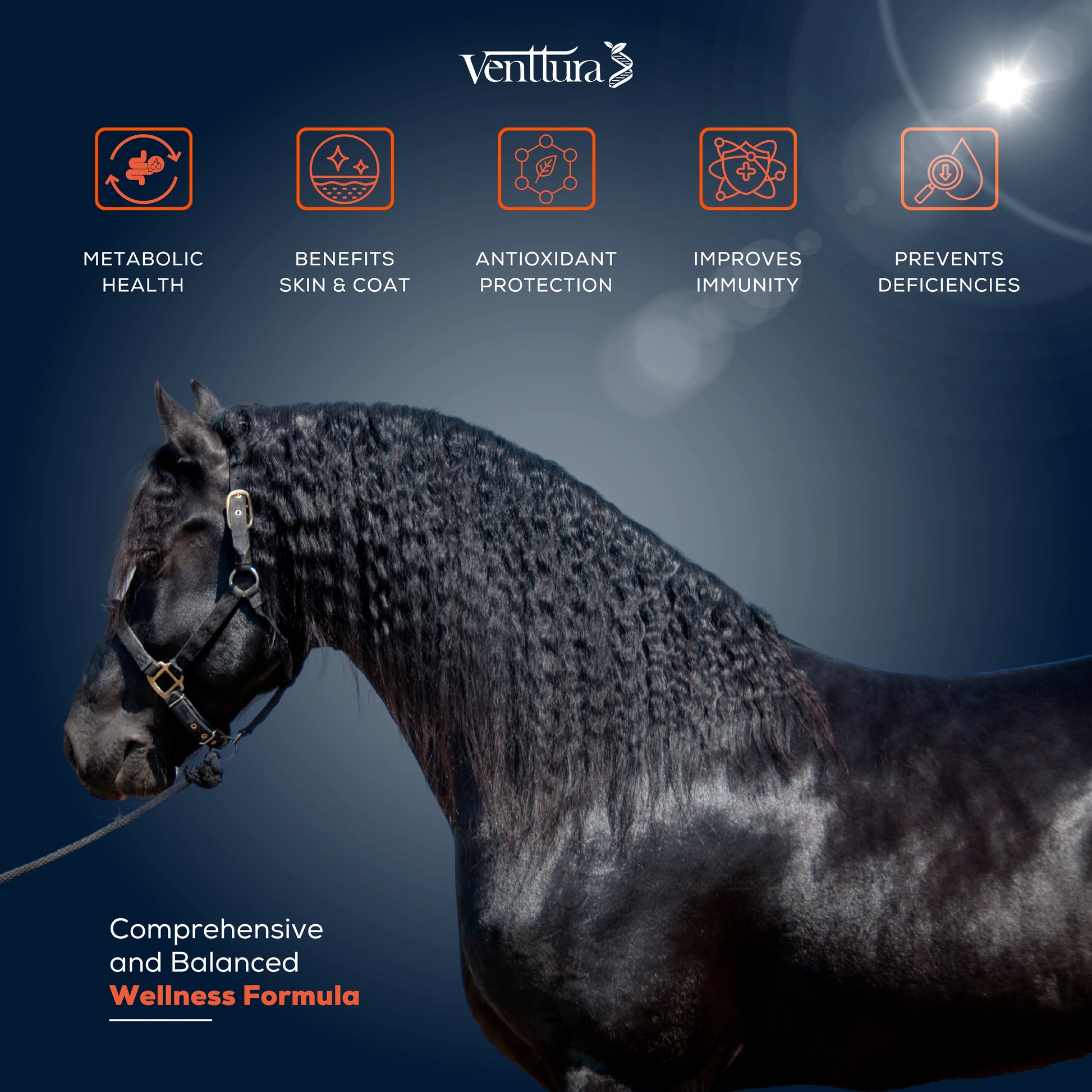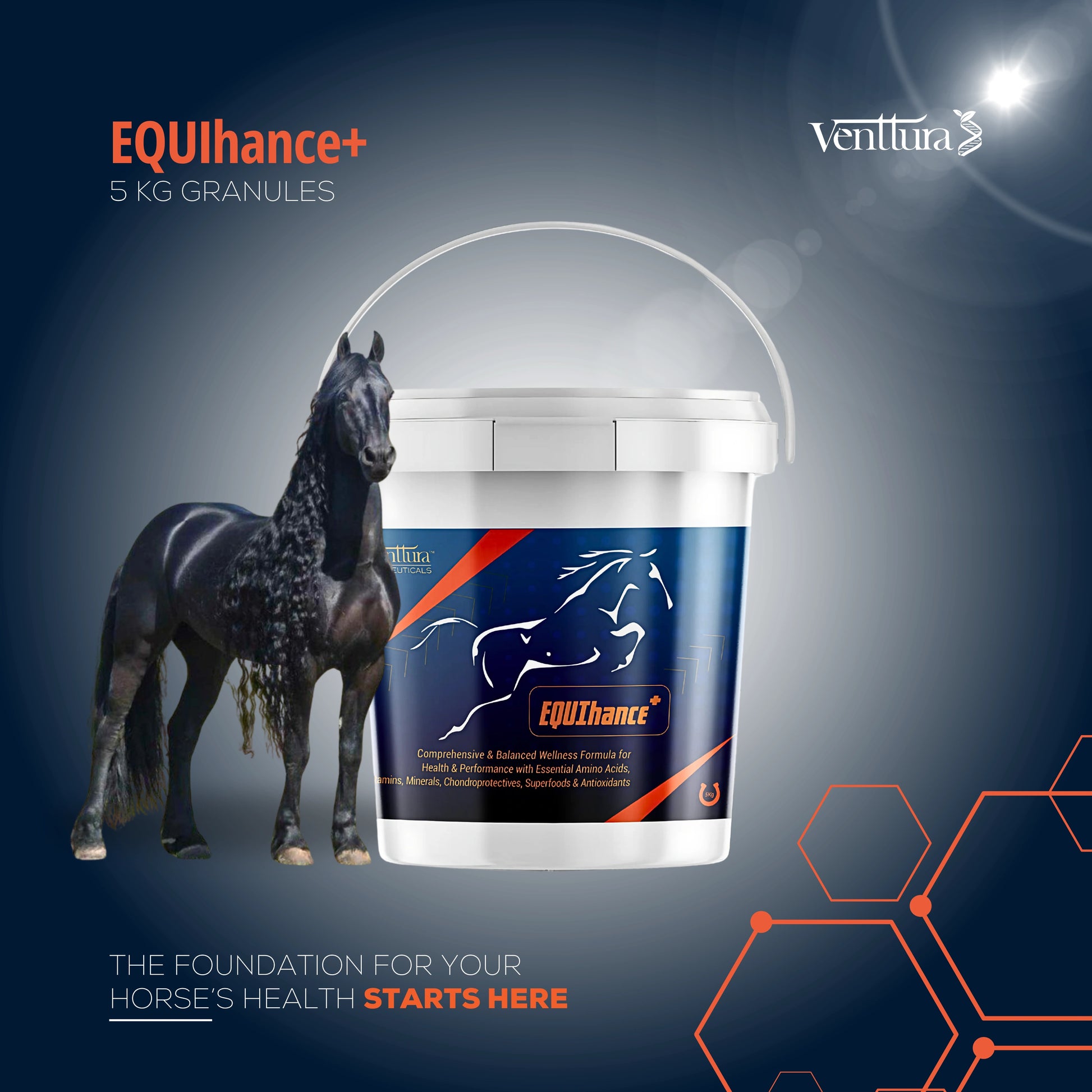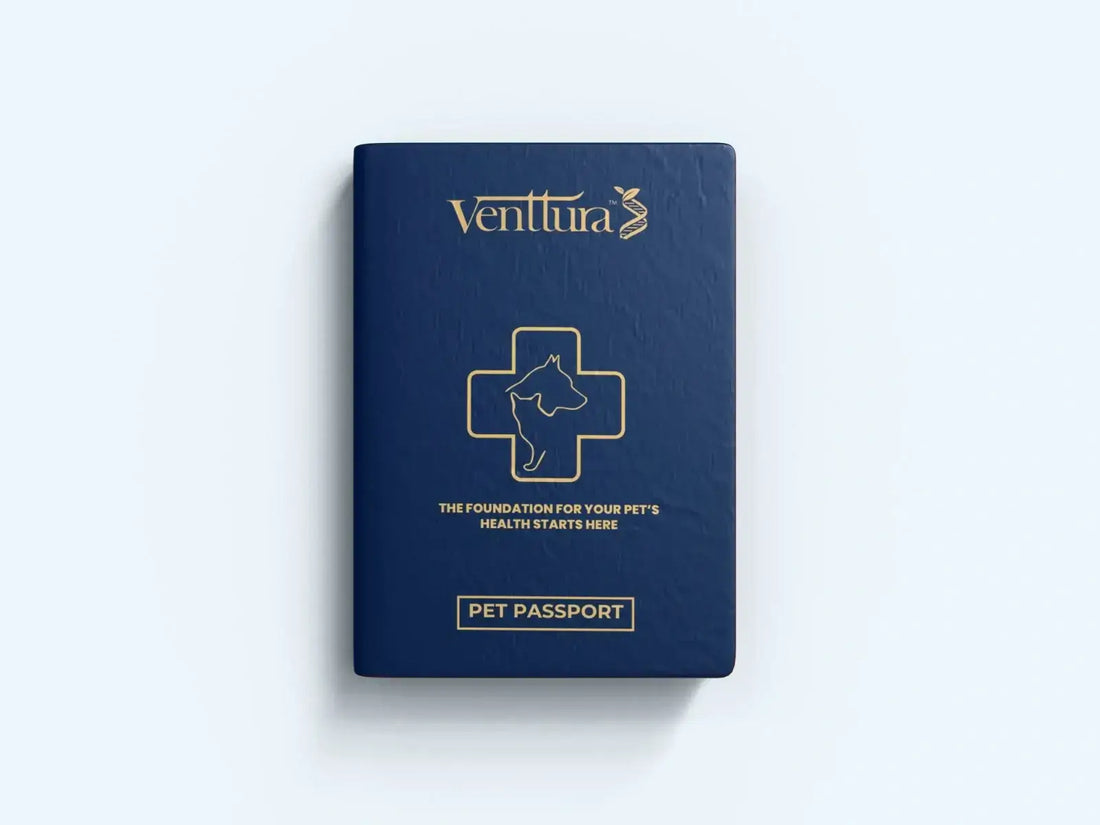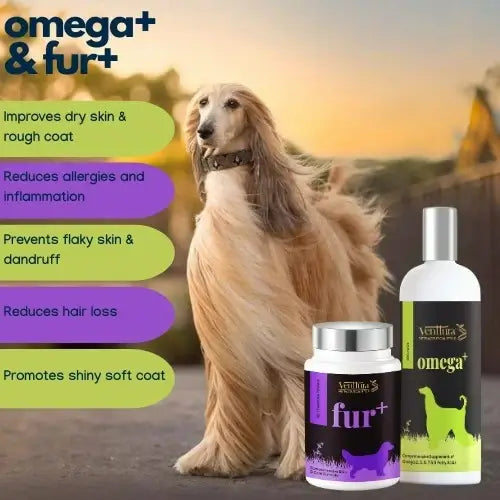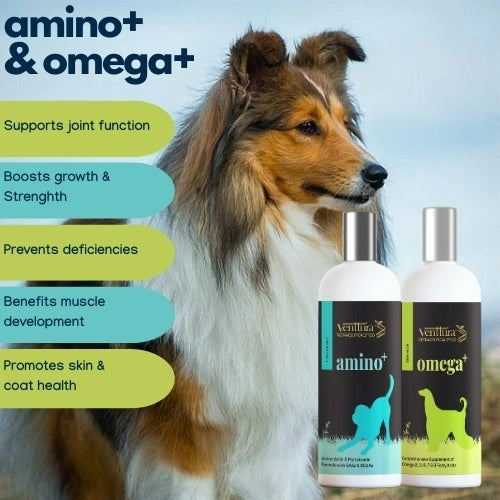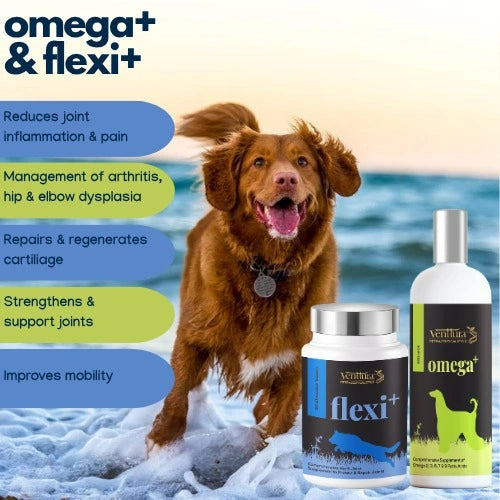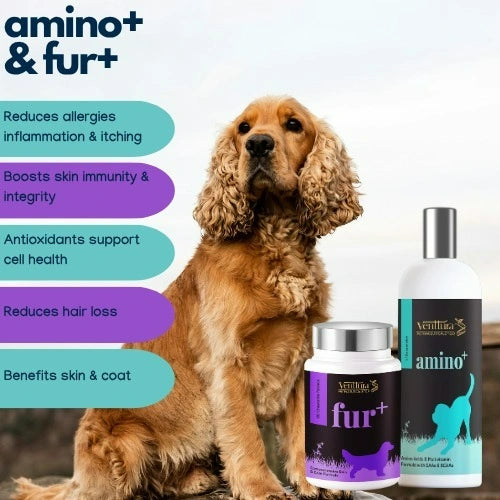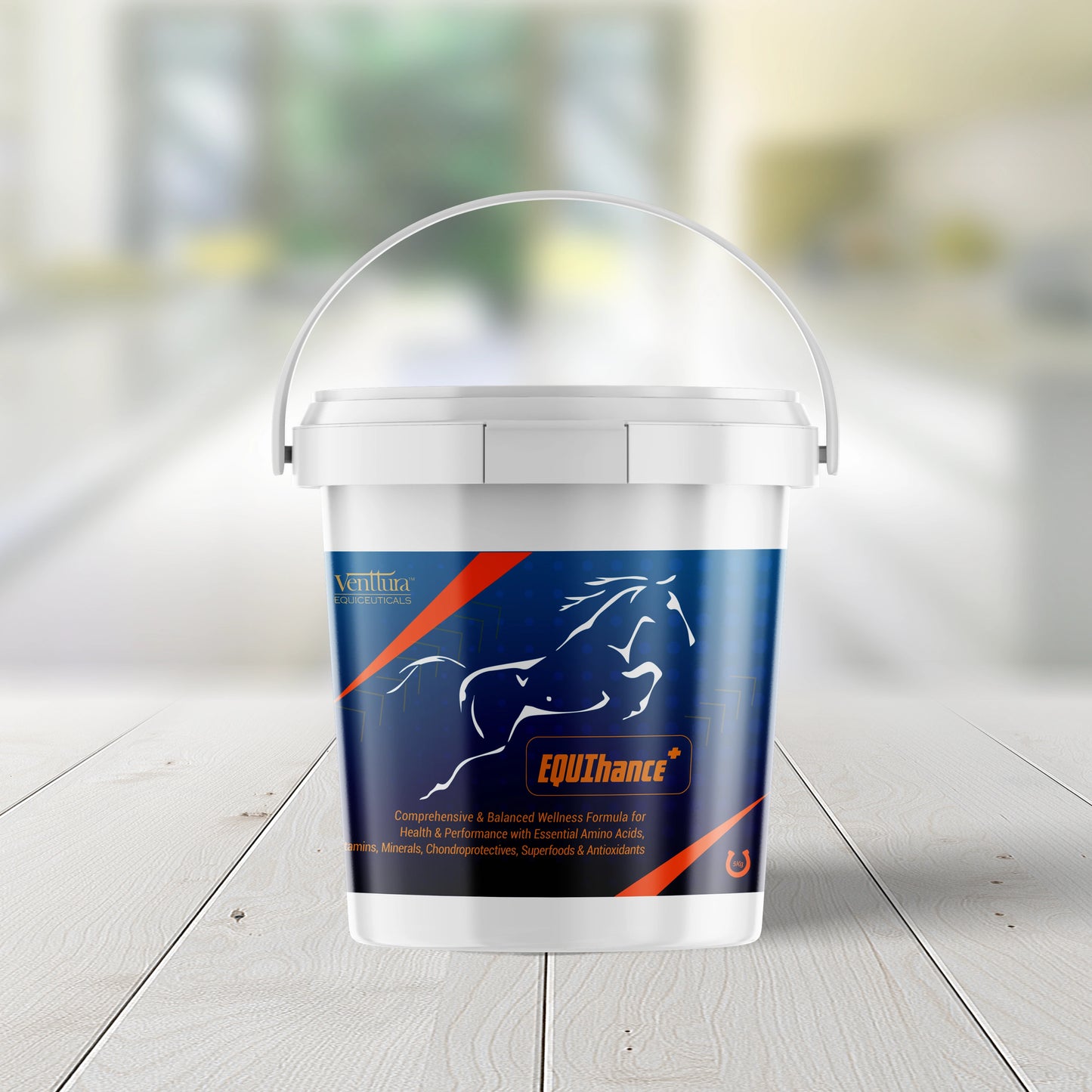
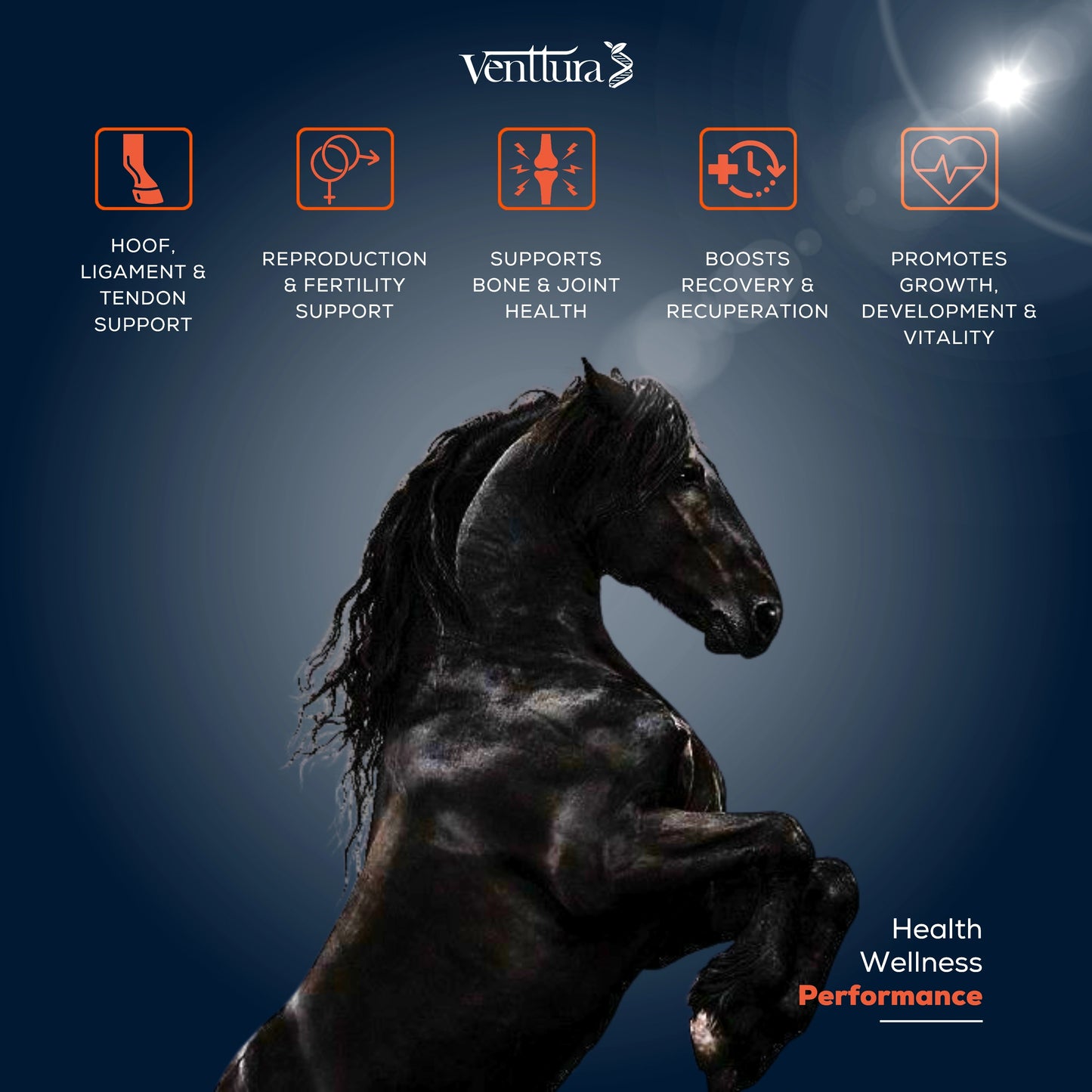
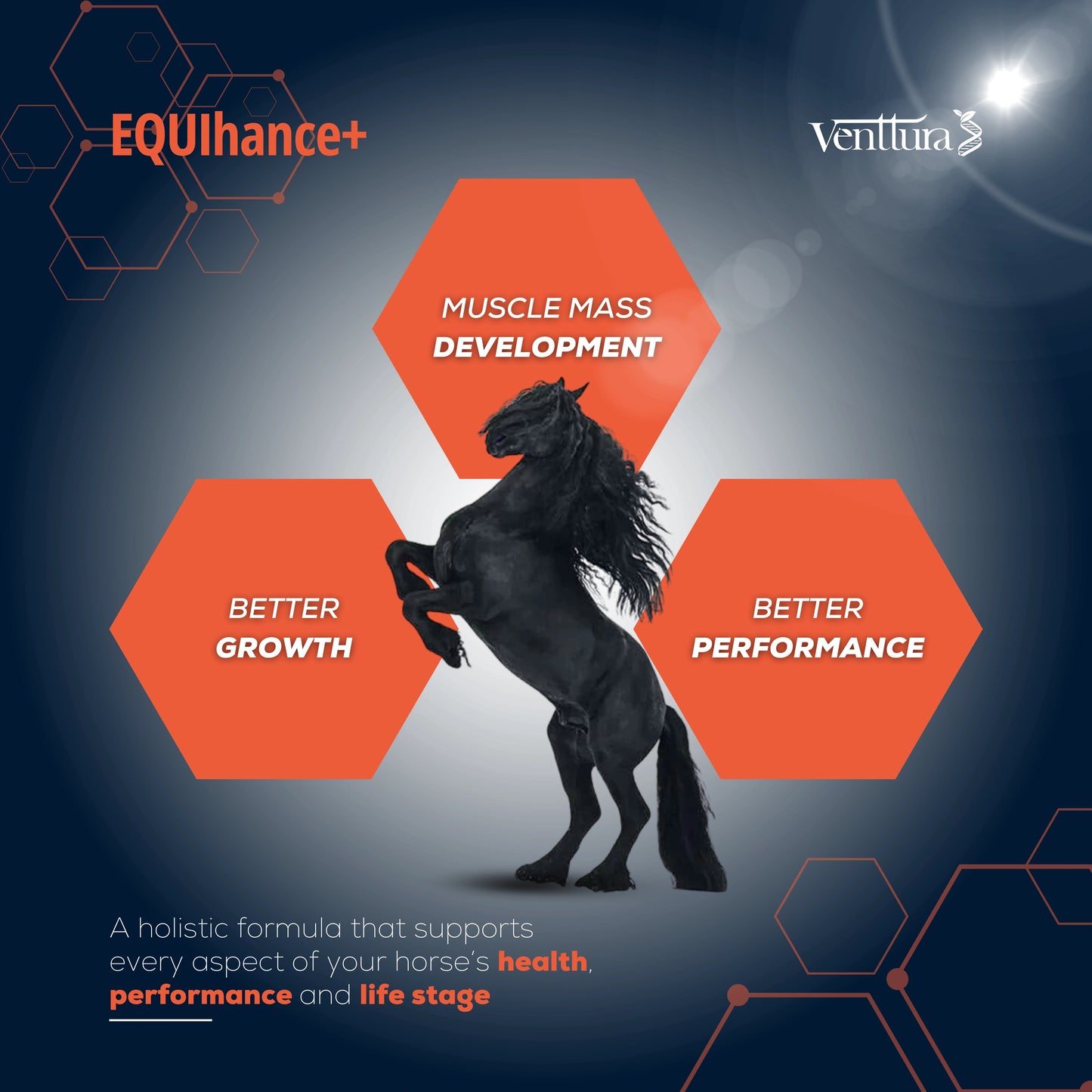
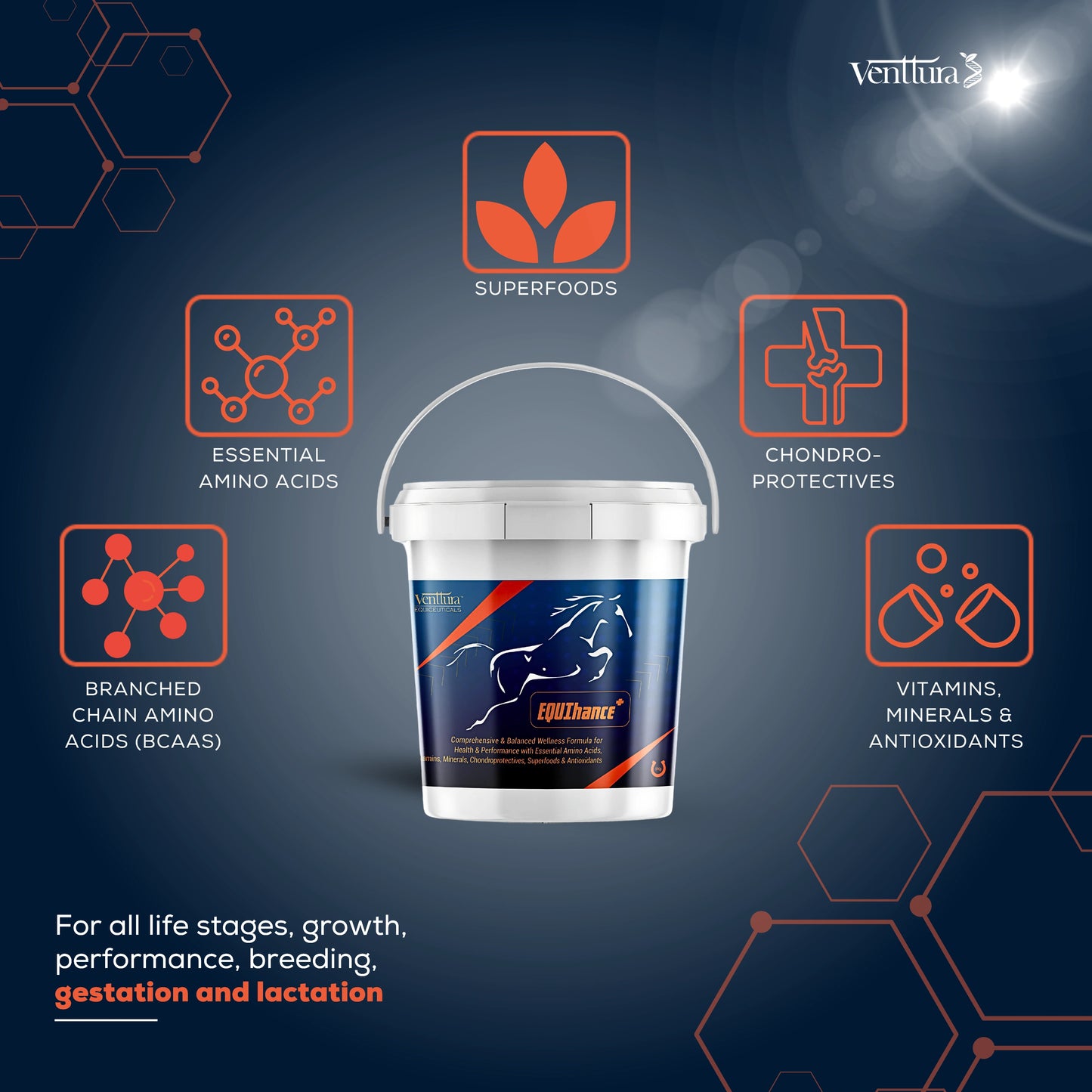
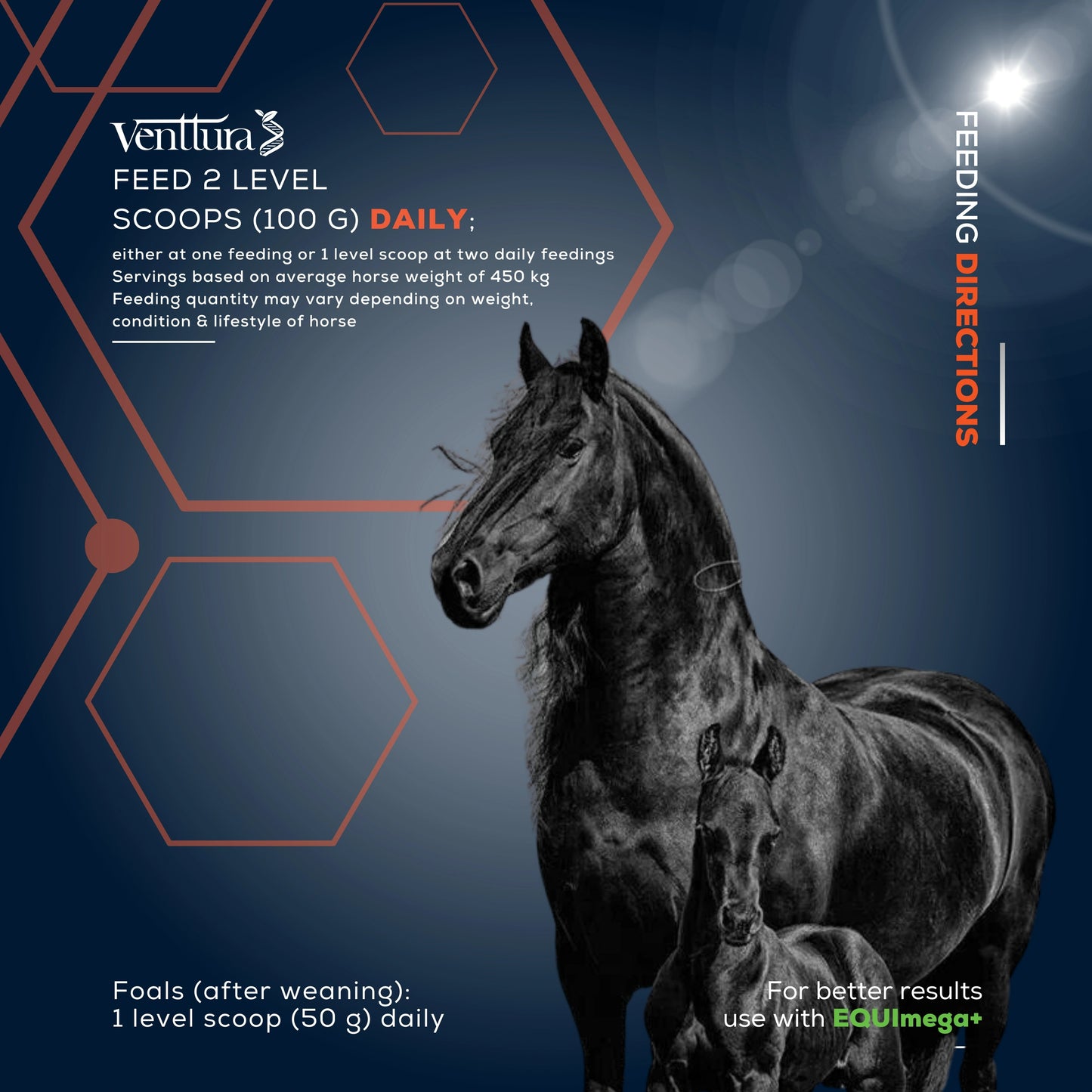
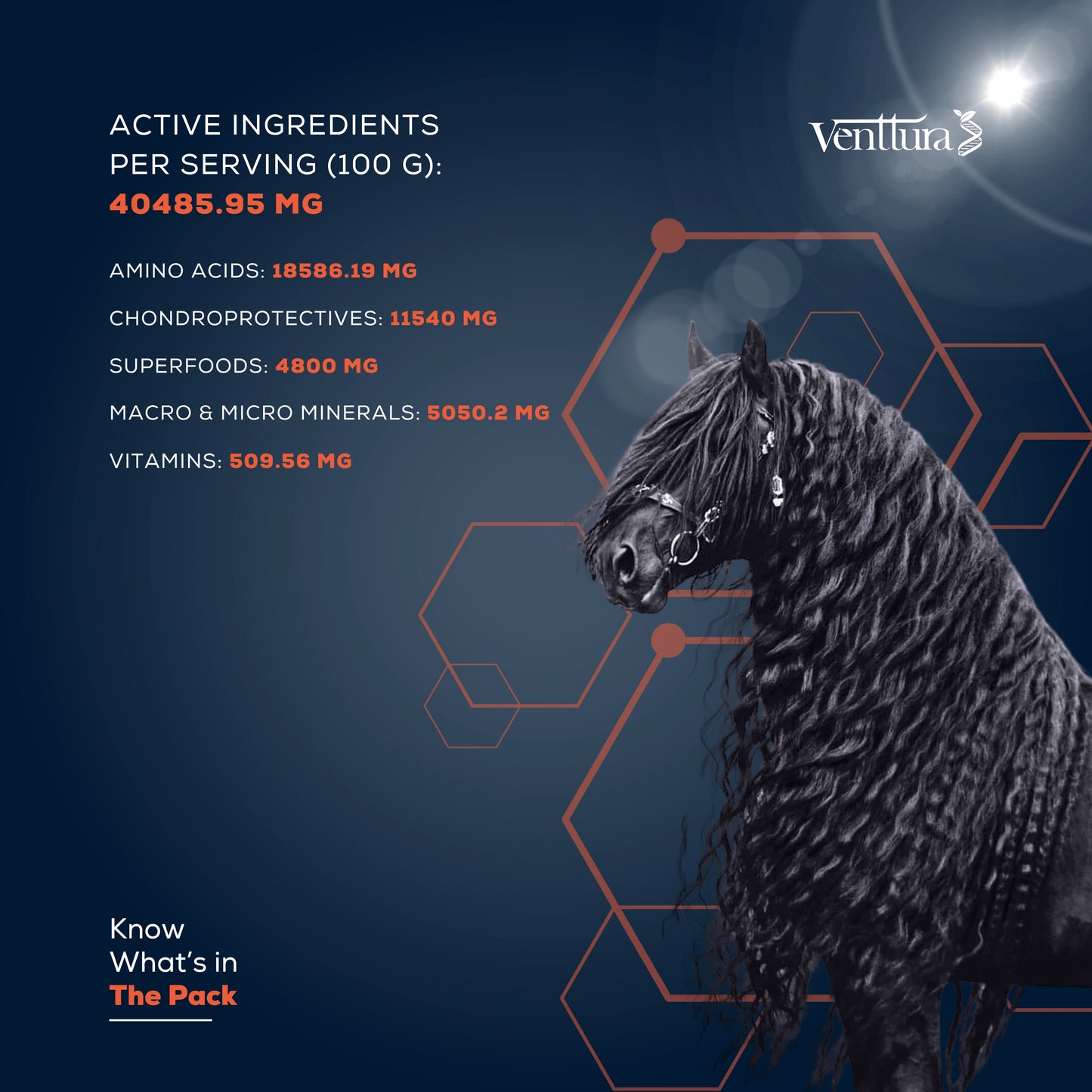
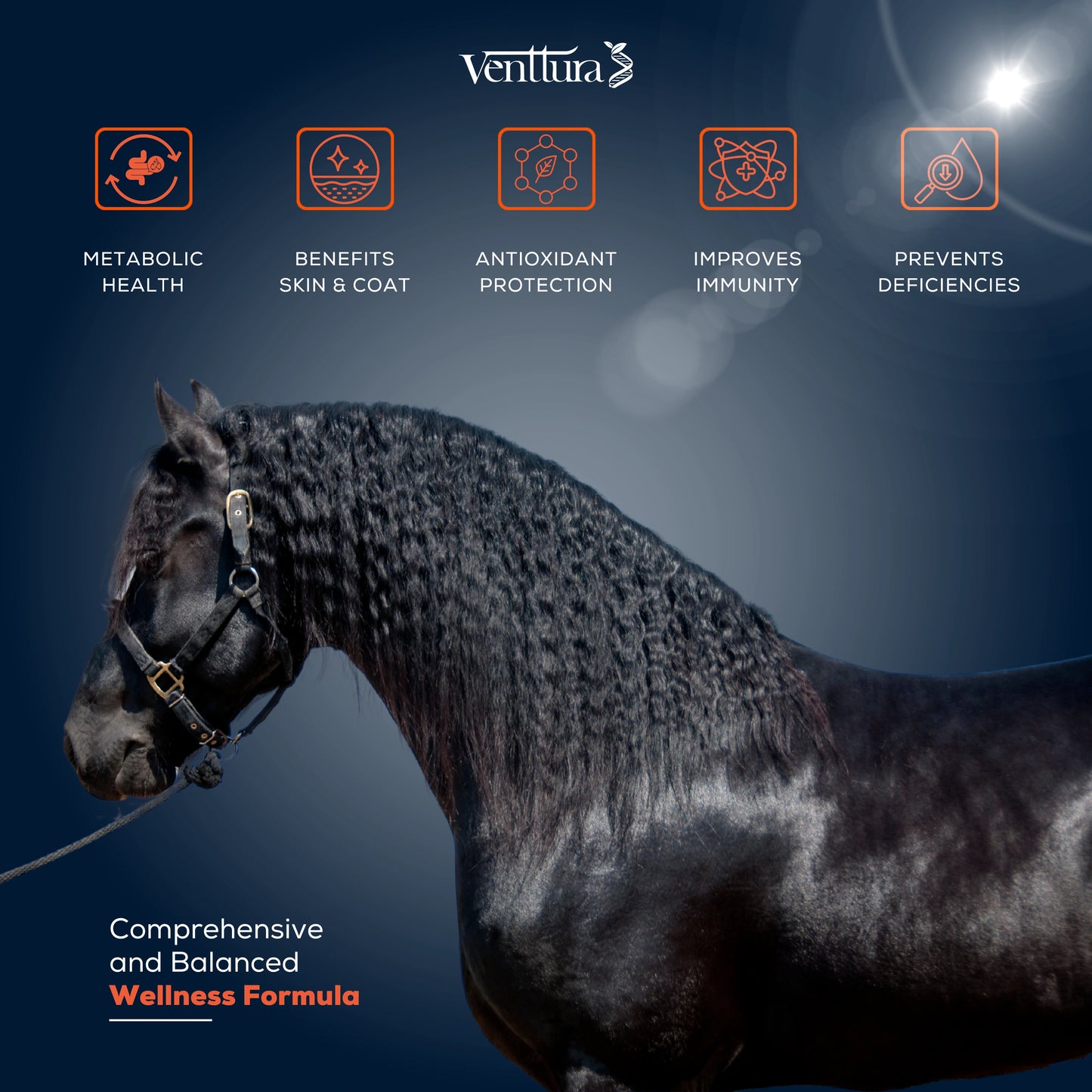
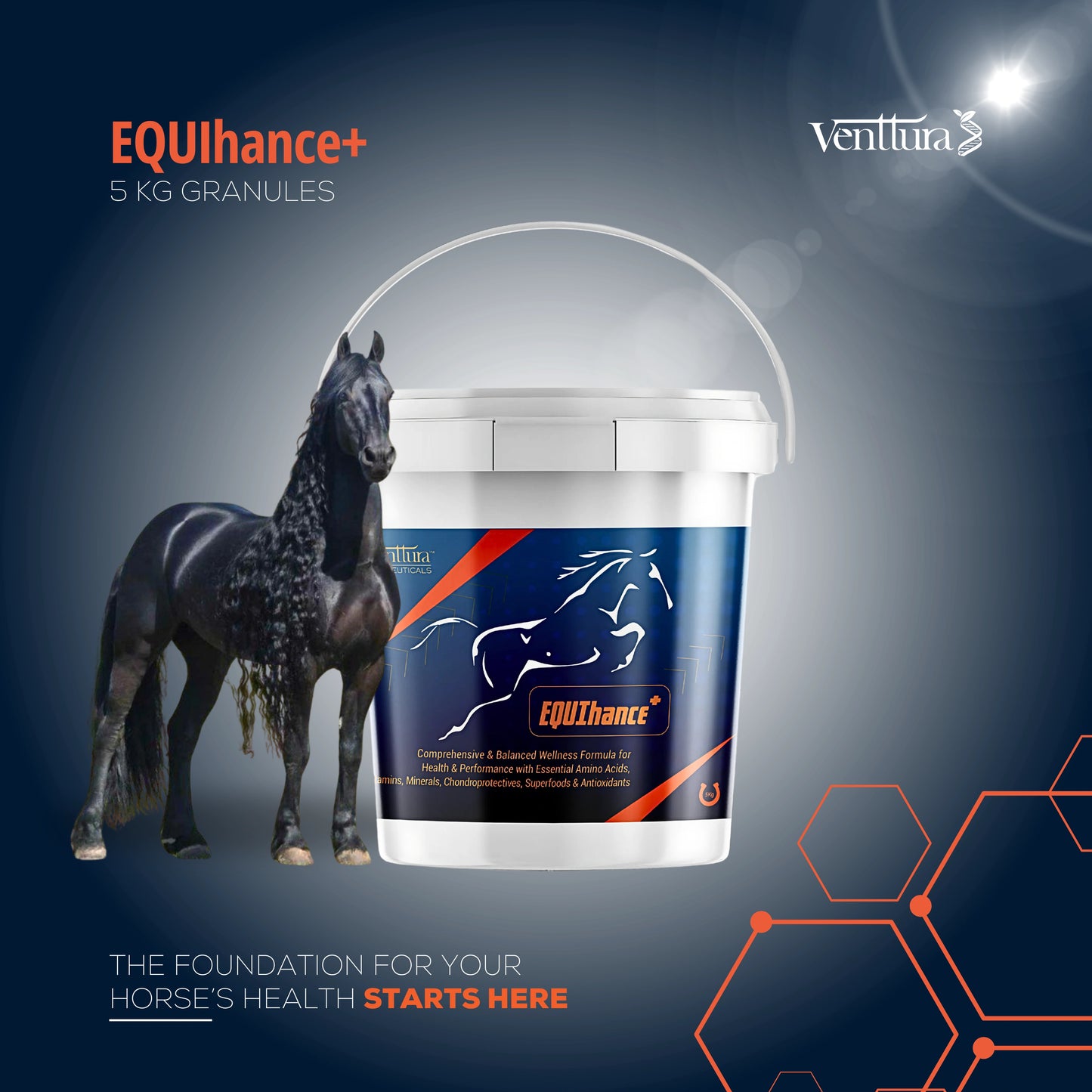
Benefits of Ingredients
-
Amino Acids:
Amino acids are the building blocks of proteins. Proteins are digested to small molecules called amino acids. These have many functions in the body; growth, repair, structural units of hair, skin, hooves, build muscle, boost immune system, make hormones, etc. Amino acids are classified as essential, non- essential and conditional.
-
Essential Amino Acids:
These cannot be synthesised by the body in sufficient quantities and must be supplied in the diet. These are individual "building blocks" for tissues, organs, enzymes, hormones, antibodies etc. For horses, these include Leucine, Isoleucine, Valine, Arginine, Methionine, Histidine, Phenylalanine, Threonine, Tryptophan and Lysine.
-
Branch Chain Amino Acids (BCAAs):
The three branch chained amino acids (BCAAs) are Leucine, Isoleucine and Valine. These are vital for muscle development and maintenance and utilization of other amino acids to build proteins. When combined with regular exercise, they help to reduce cholesterol as well boost weight loss, regulate muscle turnover and prevent high blood sugar, as well as aid in haemoglobin production and may facilitate wound healing. Help in muscle recovery and promote growth in foals.
-
Limiting Amino Acids:
When an essential amino acid is deficient to the point of limiting protein synthesis, it is called a “limiting” amino acid. Lysine, threonine, and methionine are typically considered the first, second, and third limiting amino acids in equine diets. They are "limiting" because if they are deficient, the horse cannot make full use of the protein for hair coat, hoof growth and muscle development.
-
Lysine:
It supports muscles, connective tissues, the nervous system and the immune system. Promotes bone health, fat conversion and improves skin and coat.
-
Methionine:
Needed for protein metabolism, muscle function & generation of energy, benefits skin, coat, tendons, ligament and hoof health. Supports liver health & urine pH.
-
Threonine:
It supports optimal gut health and nutrient absorption. It is a building block of protein and one of the main limiting amino acids in horse diets, along with methionine and lysine.
-
Leucine:
One of the three branch chained amino acids (BCAAs) along with Isoleucine and Valine. Vital for muscle growth, development and maintenance and utilization of other amino acids to build proteins. It supplies energy to the body even when under the stress of training, and preserves muscle glycogen used for muscle contraction.
-
Isoleucine:
It is a branch-chained amino acid (BCAA). Its primary function is to increase endurance, repair, recovery & rebuilding of muscle. Boosts energy production and recovery after exercise. Supports wound healing as it plays a role in blood clotting.
-
Valine:
A branch chained amino acid, which acts along with Leucine and Isoleucine. The three combine to regulate muscle turnover and energy metabolism. Benefits functioning of the liver, immune and nervous system.
-
Arginine:
Enhances overall exercise performance by reducing impact of lactic acid, boosts recovery, helps to improve renal & cardiac function and blood flow, supports the immune system, induces release of growth hormone, helps wound repair, surgical recovery and tendon healing.
-
Glycine:
Helps increase muscle mass, prevents muscle degeneration & reduces repair time and improves overall performance, helps in production of collagen benefiting skin, tissue, etc.
-
Tryptophan:
It supports muscle tone, maintains calm behaviour and together with methionine helps in hair growth and maintenance. Needed for the production of neurotransmitter, serotonin, which acts in the brain to reduce anxiety, promote concentration, calm and relaxation.
-
Tyrosine:
It is a non-essential amino acid that plays an important role in the production of neurotransmitters that are required in the proper functioning of the brain. It may help reduce stress and aggression. Along with Phenylalanine, it is responsible for optimal coat and eye iris pigmentation.
-
Cysteine:
It is a sulphur - containing amino acid that makes the protein keratin, which makes up hair and nails. It helps in the production of the antioxidant glutathione and helps eliminate free radicals. It also helps in boosting the immune system and in collagen production for healthy skin and joints.
-
Phenylalanine:
Responsible for appetite control, synthesis of Tyrosine and other hormones and helps in pigmentation in skin and coat.
-
Aspartic Acid:
Helps in synthesis of cell energy. It plays a vital role in metabolism during formation of other amino acids. Participates in the synthesis of glucose and in neurotransmissions. It may help in improving fertility, help in detoxification of the liver and in optimal brain functioning.
-
Alanine:
It helps in energy production, muscle protection and toxin elimination. It supports muscle performance through the formation of carnosine, which acts as a buffer against lactic acid build up. It builds condition and shortens recovery time.
-
Histidine:
Along with alanine it is needed for synthesis of carnosine that deals with lactic acid build up in muscles. Also needed for formation of histamine that is a component of the immune system.
-
Proline:
It is necessary for the production of collagen and maintaining flexibility of joints and contributes to stronger bones. Helps alleviate pain related to osteoporosis. Helps in repair of muscle and tissue damage and enhances the immune system.
-
Chondroprotectives:
These are nutrients that protect, nourish, repair and regenerate cartilage, especially ‘articular’ cartilage, which is found in joints like the knee joint, shoulder joint, etc. The cartilage in joints is under stress and strain everyday and is prone to wear and tear leading to pain, inflammation, stiffness, lameness and eventually to progress to Osteoarthritis (OA). Special nutrients can alleviate these conditions and improve joint health.
-
Omega 3:
These are vital for healthy skin, coat, joints, combat infections & allergies and have anti-inflammatory properties. Also boost the immune system, provide support in kidney diseases, heart diseases, cancers, alleviate Inflammatory Bowel Diseases (IBD), support cardiac & cognitive function, development in young animals, etc.
-
Omega 6:
These are necessary for promoting healthy skin and coat, reproductive function and immune system. Helps address seborrhea, atopy, autoimmune disorders, arthritis and inflammations. Helps prevent certain cancers and heart diseases.
-
Glucosamine:
Needed for the synthesis of hyaluronic acid and glycosaminoglycans, that make up the synovial fluid and to manufacture collagen, that makes up cartilage. Along with chondroitin sulphate, it helps in reducing the pain and inflammation related with arthritis.
-
Aloe Vera:
Has high quantities of natural antioxidants like Vitamin E, Vitamin C, carotenoids, flavonoids and tannins, thereby reducing stiffness associated with joint disorders. It has anti-inflammatory, antimicrobial and analgesic properties. Aloe vera increases collagen synthesis and helps in wound healing.
-
Superfoods:
These are foods that are rich in a variety of nutrients like proteins, antioxidants, vitamins, minerals, etc. and offer multiple health benefits.
-
Alfalfa:
It is rich in proteins, minerals, vitamins and antioxidants. It has anti-inflammatory and analgesic benefits and supports the digestive system and function.
-
Brewer’s Yeast:
It is a very good source of protein, minerals and vitamins. It is a good antioxidant, improves immunity and digestive health & function, promotes gut flora, reduces stress and anxiety in animals and benefits skin and coat.
-
Essential Minerals:
Need to be supplied in the diet, as the body cannot produce them. They perform many different functions in the body such as the formation of bone and cartilage, maintenance of fluid and acid/base balance, transportation of oxygen in the blood, normal functioning of muscles and nerves, acting as catalysts, production of hormones, etc.
-
Calcium:
Essential for healthy growth and development of the skeletal system. Also required for blood coagulation, muscle contraction and nerve transmission. Prevents milk fever or eclampsia in lactating animals.
-
Phosphorus:
Along with calcium it forms an essential component of bones. It is required for digestion, excretion, protein synthesis, hormonal balance, energy synthesis, cell repair and many metabolic reactions.
-
Sulphur:
It is essential for a healthy coat, skin, and joints. It works with B-complex vitamins for basic body metabolism and is a part of tissue building amino acids like methionine and cysteine. It helps in healing of wounds as well as in detoxification of the body. It is also needed for building collagen and for the synthesis of the B vitamins Thiamin and Niacin as well as hormones like insulin.
-
Silicon:
It stimulates formation of collagen, which is a protein that gives bones their strength and flexibility, joint cartilage its cushioning ability, and a scaffold upon which bone mineralization occurs. Silica also helps in the assimilation of calcium.
-
Iron:
It is a trace element that is important for haemoglobin production, brain development, muscle activity and regulation of body temperature. It also helps boost immunity. It is necessary for transport of oxygen throughout the body.
-
Zinc:
The second most abundant mineral found in the body after iron. Plays a role in immune function, protein synthesis, wound healing, DNA synthesis, brain function, skin, coat, hormone production, fertility and cell division. Zinc also supports normal growth and development in a growing animal. It is vital for maintenance of healthy skin and coat. Acts as an antioxidant and is an integral part of several metabolic and enzymatic processes.
-
Potassium:
It is required for body fluid maintenance, nerve conduction (including normal heart rhythm) and certain metabolic processes. Potassium is the main electrolyte in intracellular fluid.
-
Sodium:
It is required for body fluid maintenance, nerve conduction (including normal heart rhythm), muscle contraction and transport of glucose across the membranes. It is important for the maintenance of acid-base balance in the body.
-
Chloride:
It helps maintain the proper acid/alkali balance in the body. It is also necessary for the production of hydrochloric acid (HCl) in the stomach which helps in the digestion of protein.
-
Magnesium:
It one of the most abundant substances in the cells. Assists in energy production, maintains healthy bone density, muscle action and helps keep the electrical balance across membranes.
-
Manganese:
It is a trace element and a micronutrient needed to produce energy, metabolize protein and carbohydrates, and to make fatty acids. Manganese is an important part of many enzymes and plays a role in the health and maintenance of bone and cartilage in joints.
-
Copper:
It plays an important role in the functioning of the nervous and cardiovascular systems and in the formation of haemoglobin in blood. It also helps in the formation of collagen aiding in skin and joint health and may act as an antioxidant as well as help in the prevention of osteoporosis. It maintains coat pigmentation.
-
Cobalt:
It is a component of Vitamin B12, Cobalamine. It helps in the synthesis of RBCs and maintains nerve tissue. It also aids in absorption of iron.
-
Chromium:
It aids the body in losing body fat, lowering blood sugar levels and reducing cholesterol levels; in regulating insulin levels, by metabolizing carbohydrates, fats and proteins properly. It may also help prevent heart diseases.
-
Selenium:
It is a potent antioxidant reducing the harmful effects of free radicals. It has benefits to the heart and may prevent certain cancers, help in maintaining skin and coat, help in faster healing of wounds and help in boosting fertility and virility.
-
Iodine:
It is a trace element that is vital for the functioning of the thyroid gland that makes the hormone for regulating the metabolism as well as the growth. It maintains energy levels and helps in the formation and maintenance of healthy skin, hair and nails.
-
Vitamins:
Necessary for hundreds of biochemical reactions and body functions. Needed for growth, tissue maintenance, development, athletic performance, breeding, etc. Vitamins are classified as either water-soluble or fat-soluble.
-
Vitamin B1 (Thiamine):
It is a water-soluble vitamin. Aids in metabolism of carbohydrates, fats and proteins, maintenance of normal growth, transmission of nerve impulses, and acetylcholine synthesis. Acts as an antioxidant that boosts kidney circulation. Essential for healthy skin, hair, eyes and liver. Helps improve the immune system.
-
Vitamin B2 (Riboflavin):
It is a water-soluble vitamin. It is part of a number of coenzymes in most cells. It is also used for the production of red blood cells and antibodies that help fight diseases. It helps prevent cataracts and aids in energy production by cells of the body. Riboflavin works with vitamin A to maintain mucous membranes and helps the absorption of iron and vitamin B6 in the intestines. Assists in metabolism of nutrients including fats, carbohydrates, and proteins, and helps activate vitamins B3 and folic acid (B9). Acts as an antioxidant and helps in removal of waste products from the kidneys.
-
Vitamin B3 (Niacin):
It is a water-soluble vitamin. It is required for carbohydrate metabolism and energy production. Needed for healthy skin and proper circulation of the blood throughout the body. The secretion of bile and stomach acids requires niacin. Niacin lowers cholesterol and helps with the synthesis of hormones.
-
Vitamin B5 (Calcium Pantothenate):
It is a water-soluble vitamin. It is involved in the production of adrenal hormones and antibodies, is an essential part of coenzyme A and enhances stamina.
-
Vitamin B6 (Pyridoxine):
It is a water-soluble vitamin. Helps in amino acid metabolism, synthesis of proteins, hormones and neurotransmitters. It promotes red cell production, cardiac functioning and sodium-potassium balance, antibody formation and immune system functioning. Needed for absorption of vitamin B12.
-
Vitamin B7 (Biotin):
It is a water-soluble vitamin. Like other B vitamins, it plays an important role in many metabolic reactions. It is necessary for maintaining healthy skin and hair. Also important for growth, digestion, muscle formation and glucose metabolism.
-
Vitamin B9 (Folic Acid):
It is a water-soluble vitamin. Plays an important role in synthesis of DNA, homocysteine metabolism, cellular division, RBC production, development of the nervous system and synthesis of neurotransmitters.
-
Vitamin B12 (Cobalamin):
It is a water-soluble vitamin necessary for energy production; for maintaining bone mineral health and to prevent osteoporosis, for nervous system function as it is needed to produce myelin, the protective sheath around nerves; for the production of acetylcholine, a neurotransmitter; for the synthesis of red blood cells; for producing the genetic materials, DNA and RNA, for production of collagen and for liver function and protection.
-
Vitamin C:
It is a water-soluble vitamin vital for synthesis of collagen, which forms a component of cartilage, tendons, etc. Acts as an antioxidant, attacking free radicals in cellular fluids formed due to cell metabolism. May help in age related as well as diabetic cataract. Helps boost immunity.
-
Vitamin A:
It is a fat-soluble vitamin. Beneficial for eyes, immune system, bone metabolism and healthy skin. Helps in organ growth in a developing foetus. Acts as an antioxidant that eliminates free radicals and prevent cell & tissue damage, slows down the process of ageing, helps in preventing cardiovascular diseases, cancer, inflammatory diseases, etc.
-
Vitamin D:
It is a fat-soluble vitamin. It is needed for proper absorption of calcium and phosphorus from the intestinal tract. It is needed for normal growth and development of bones and teeth, it protects against muscle weakness, and regulates the heart. Vitamin D helps prevent osteoporosis, enhances immunity, and is needed for proper thyroid function and blood clotting.
-
Vitamin E:
It is a fat-soluble vitamin. Powerful antioxidant that eliminates free radicals and prevents cell & tissue damage, slows down the process of ageing, helps in preventing cardiovascular diseases, cancer, inflammatory diseases, maintaining healthy skin and coat, etc.
-
Choline:
It is a nutrient similar to vitamins. It helps in proper brain functioning, detoxification processes in the liver, energy supply, maintaining the integrity of cell membranes, reducing incidence of seizures in epileptic animals, etc.
-
Antioxidants:
Eliminate free radicals and prevent cell and tissue damage, slow down the process of ageing, may help in preventing cardio vascular diseases, cancers, inflammatory diseases, etc.

Note:

Endorsed by Experts, Trusted by Pets Parents!
Shop Combo
-
Soft & Shine: Omega+ (150ml) & Fur+ (45 Tablets)
Regular price Rs. 824.00 (20% OFF)Regular priceUnit price perRs. 1,030.00Sale price Rs. 824.0020% OFF -
Ultimate Health : Amino+ & Omega+ (150ml each)
Regular price Rs. 668.00 (20% OFF)Regular priceUnit price perRs. 835.00Sale price Rs. 668.0020% OFF -
Mobility Care : Flexi+ (45 Tablets) & Omega+(150ml)
Regular price Rs. 1,160.00 (20% OFF)Regular priceUnit price perRs. 1,450.00Sale price Rs. 1,160.0020% OFF -
Coat Booster: Amino+ (250ml) & Fur+ (90 Tablets)
Regular price Rs. 1,192.00 (20% OFF)Regular priceUnit price perRs. 1,490.00Sale price Rs. 1,192.0020% OFF

